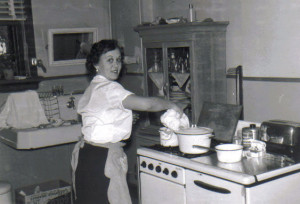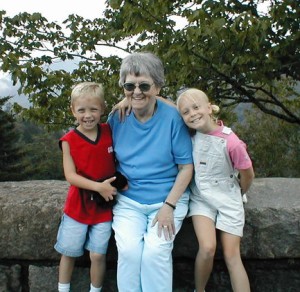 I heard this simple phrase many times growing up: “You are so like your mother.” I see her when I look in the mirror. I’m short like her (I got one more inch), I see echoes of her features, her body type, her smile (I did not, however, inherit her dimples).
I heard this simple phrase many times growing up: “You are so like your mother.” I see her when I look in the mirror. I’m short like her (I got one more inch), I see echoes of her features, her body type, her smile (I did not, however, inherit her dimples).
Simply put, I owe everything that’s good about me to my mother. Of course my father played a role too; he was a generous, honorable man and I loved him very much. But there’s something special about a daughter’s link to her mom. Mom taught me how to be a good mom. She taught me how to work hard, to believe in my abilities and how important it is to fake believing in your abilities even when you don’t.
In 1967, my mother was working as a secretary at the Cincinnati Enquirer. She loved her job, she was fond of her boss and she was good at the work she did. It was a job she was grateful to have — a job that allowed her to raise herself and her mother out of poverty into a comfortable middle-class lifestyle. Mom told me how proud she was to buy her first car; she’d take her mother for drives every weekend, out of the city. She’d treat her to meals in restaurants so someone else could wait on them for a change.
Her own mother, my Grandma Laura, was divorced and raising her alone, working two jobs to get by — days in an awning factory and nights in a diner. They lived in “cold water flats,” meaning that they only had one sink with cold water and shared a hot-water bathroom with several other renters. They lived in a tiny apartment so close to the railroad tracks that she “could wave to the conductor as the train passed.” It’s a testament to both my iron-willed grandma who “could squeeze a nickel till it screamed” and my mother that they worked hard enough to finally reach financial security and, after mom married my dad, a three-bedroom Cape Cod in an idyllic tree-lined suburb.
In 1967, my mom had a huge choice to make. She had to decide whether to quit her job to stay home with me, after I was born, or to return to her job. In her generation, that’s what moms did — they stayed home to raise their children. So while this is a decision most working moms have to face, even today, in the ’60s it was even more poignant.
In the spring of 1968, my mother became the first employee at the Cincinnati Enquirer to return after maternity leave.
I can’t document that this was definitively true — I’m only going by what she told me. But it very well could have been the case. And even if it wasn’t, she was certainly among the very first tiny handful to do so. Such a pioneer!
Mom said she didn’t have a choice. She had to work because my dad didn’t earn enough money. But, really, what’s “enough” money? They could have gotten by on his paycheck. He had a steady full-time job at a bank. They could have lived in a small city apartment, like millions of other families, and made do. But mom wanted more. She’d clawed her way out of poverty — no way was she going back into it for the sake of raising a child. She wanted more for herself, and she wanted more for me.
This is not meant to promote greed or materialism. There is nothing wrong with living on one small income in a city apartment, being frugal, choosing to give up a career to stay home with children. It’s about having choices.
Mom felt a lot of guilt about the choice she made, leaving me with her mother instead of caring for me herself like all the other moms she knew. For not doing what she was “supposed to do.” At the same time, she felt a lot of pride. Each morning she’d put on nice clothes, ride downtown with my dad and head through the brass revolving door into the art-deco lobby of 617 Vine, up to the 4th floor, to her own office. She would eat lunch with my dad in a restaurant (or join him in the break room with a “brown bag”), chat with co-workers, feel important and useful and, most of all, capable. As someone who has given up that job to stay home with the little ‘uns, I can tell you that though it’s rewarding, being a housewife and mom doesn’t always give you the same sense of accomplishment as holding a job and bringing home a paycheck.
And because my mother did that, I learned that I also had choices. In fact, it had never even occurred to me that I might be expected to do what those 1960s-and-earlier moms were expected to do, give it all up to be a housewife and mom, or go to college just to get that “MRS degree.” My mother never deferred to my father; she was equal. Mom said I could do anything in my life that I wanted, and I never believed it was otherwise — at least, not because I was a woman.
Mom said: “Never put yourself in a position where you rely on a man to support you. Always be able to take care of yourself, because you never know.”
My dad never let us down… but hers did.
My husband would never let us down either. I exercised my freedom of choice when my own babies came along; I quit my job and stayed home. She supported me 100{5b6c00ae8a31f44c65b344f315968efbd322bfc6ea45e4e8cca9716c4473fad8} in this endeavor. Because I was still able to take care of myself, and the kids, if I had to. Because of her, I had choices.

My babies are nearly grown now. But thanks to those choices, I didn’t skip a beat — I have a successful freelance editing/writing business and also own an antique shop. I couldn’t have done it without her, without her belief in me, without her “fake it till you make it” advice, her sense of duty and her indefatigable work ethic.
My dad passed away in 1999 and my mom in 2007. But they’re not really gone. They are still a big part of who I am and will always be. I see them in my own children as well; they both have my mom’s expressive blue-gray eyes, my son has her dimples, my daughter has her nose. And they both have a firm belief in their own capabilities, in a future filled with choices and possibilities and, most of all, they have a firm foundation of love. For that is the most important gift my parents gave me, and the greatest one to pass along — the gift that makes everything else possible.
Happy Mother’s Day!

